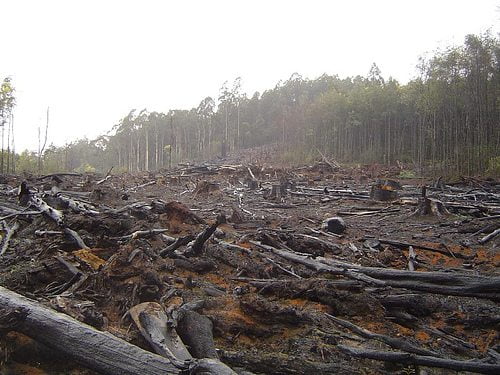

Environment
EU one of the largest importers of illegal deforestation products
EU imports have been linked to driving illegal deforestation in a report from campaign group Fern. The UK is among the largest consumers of the good highlighted in the study.
The report – Stolen Goods: The EU’s complicity in illegal tropical deforestation – estimated that in 2012 the EU imported €6 billion (£4.3bn) of soy, beef, leather and palm oil that were grown or reared on land illegally cleared of forest in the tropics, representing almost a quarter of the total world trade.
The Netherlands, the UK, Germany, Italy and France are named as among the largest consumers of these illegally sources deforestation commodities. Together the countries are responsible for two-thirds of EU purchasing by values and three-quarters in terms of the areas of forests destroyed.
“A little under a quarter (by value) of all agriculture commodities from illegal deforestation in international trade are destined for the EU. This includes 25% of all soy, 18% of all palm oil, 15% of all beef and 31% of all leather,” the report adds.
The report notes that over 12 years since the start of the century, one football pitch of forest was illegally felled every two minutes to supply the EU with commodities. Some 60% of the illegally source commodities imported by the EU come from Brazil, with a quarter coming from Indonesia.
Fern explains that illegal deforestation is causing environmental damage, corruption, violence and human rights abuses. The organisation adds that those seeking to halt illegal deforestation have been “threatened, attacked and even killed”, despite may of these people representing the communities whose land is being taken and livelihoods being threatened.
The report notes that the EU has committed to acting to halt global deforestation by 2030, but adds “it cannot expect to achieve this while continuing to contribute to the problem through its consumption of commodities driving illegal destruction”.
Fern calls for the EU to urgently agree a plan of action for addressing deforestation and associated trade in agriculture commodities.
The latest report follows a study last year that found global trade is increasingly responsible for deforestation.
Photo: crustmania via Flickr
Further reading:
Global trade increasingly responsible for deforestation
Unilever and Reckitt Benckiser come out top in deforestation rankings
Ending deforestation would cut global emissions by one-fifth


 Environment12 months ago
Environment12 months agoAre Polymer Banknotes: an Eco-Friendly Trend or a Groundswell?

 Features11 months ago
Features11 months agoEco-Friendly Cryptocurrencies: Sustainable Investment Choices

 Energy11 months ago
Energy11 months agoThe Growing Role of Solar Panels in Ireland’s Energy Future

 Energy12 months ago
Energy12 months agoHow Renewable Energy Can Help Combat Climate Change, According to Indra Energy





























